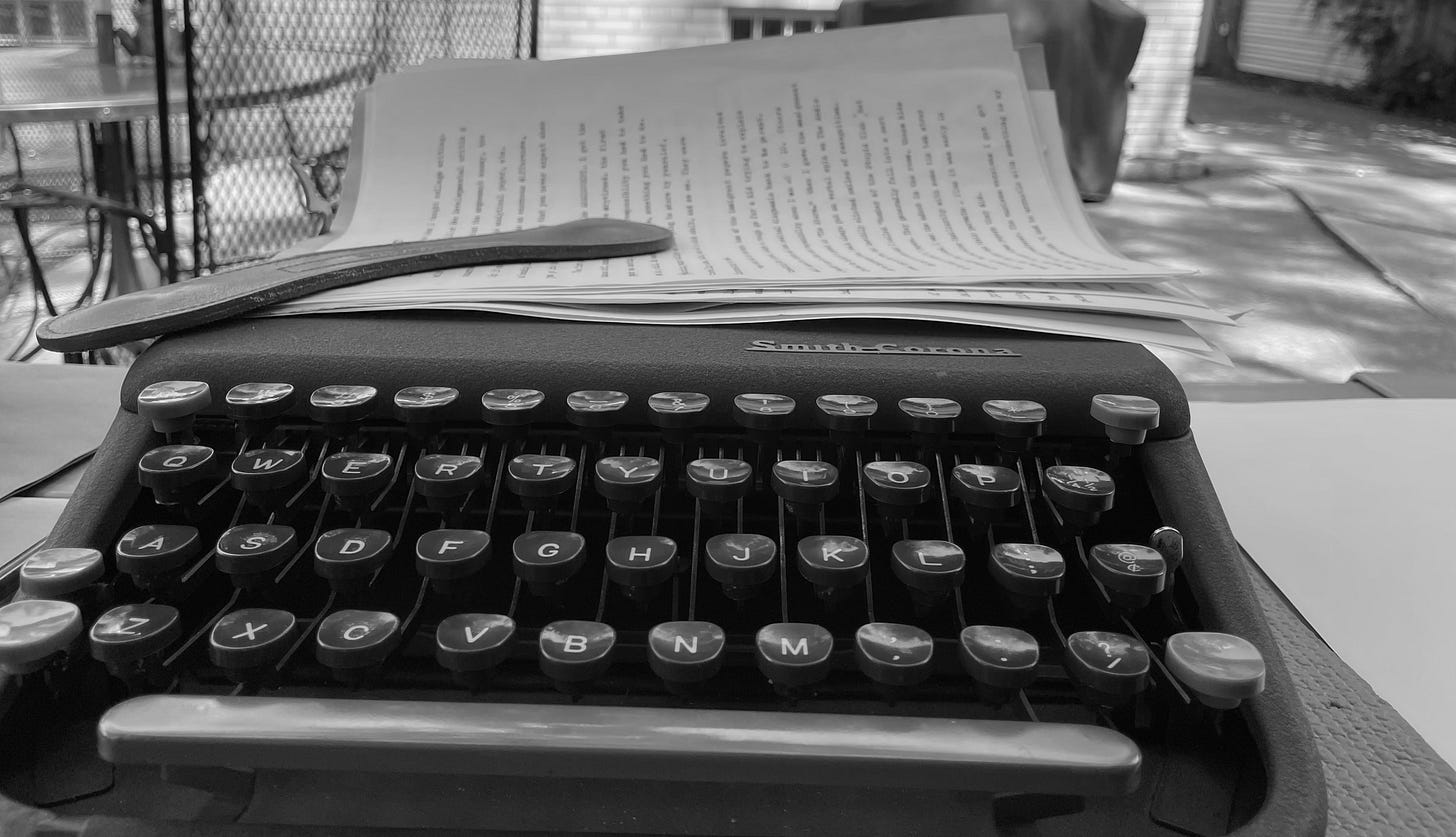Three Dangerous Tipping Points for Writers, Part III: The Looming Menace of AI Is Here
AI isn't just Artificial Intelligence. It's putting writers out of work while killing the art, craft, and skill it takes to be a critical thinker when putting together our words.
I call this Substack “The Typewriter's Collage” because it’s drafted on a machine, specifically one of my three typewriters. If you ever saw me banging away on my Royal Quiet Deluxe, Olympia SM-9, or Smith-Corona Skyriter, you'd be impressed by my speed. I type fast because I think fast. My first drafts are an unholy mess that are a joy to create. The clacking sound as my fingers fly over the QWERTY keys always fires up the endorphins of my writer brain.
Someday I hope to work a typewriter keyboard like one of the greatest musicians ever to sit before a piano and work the ivories: Chico Marx. Chico (pronounced Chick-o, by the by) drew things out of a piano that no one else could, with a physical dexterity that was all his own. His right forefinger would swing as though on a pendulum, while pinky, ring finger, middle finger, and thumb did their own set of gymnastics. Chico’s left hand wasn’t as nimble, but it provided a solid backup. On occasion he used an orange in his left hand, rolling it over the piano keys to produce the chords he wanted.
I could have chosen to model my typing skills after any run-of-the-mill pianists like Sergei Rachmaninoff or Vladimir Horowitz. I picked Chico for several reasons. First, he had a unique style that makes Sergei and Vladimir look like amateurs. Second, as you will see, Chico provides a perfect example of why the artistry of a real live human can never be substituted by AI. Finally, I’m a Marxist who understands Marxism. Chico’s faux Italian character is central to the Marx Brothers body politic, especially in their Paramount films.
Early AI versus Chico
Consider an early form of AI: the player piano. To be brief, here’s how it works. Notches are punched into a scroll which feeds through the player piano’s inner workings. Together they set off a series of motions within a complex set of bars and compressors that connect the right piano keys to the right hammers to the right piano strings at the right moment. It mimics someone playing a piano. But it’s far from the same thing.
Take a look at an old standard, The Beer Barrel Polka as rendered by a player piano:
Now consider the same song as delivered through Chico’s handiwork in the movie At the Circus:
The difference is stunning. Sure the player piano version is acceptable. We recognize the notes as they play the preprogrammed song. It sounds like The Beer Barrel Polka. Now compare that to Chico’s rendition. The player piano offers a perfunctory execution of the song. Chico gives The Beer Barrel Polka genuine flair, bringing a joyous quality to the song as his fingers shoot the keys. He even looks straight into the camera with a broad smile that draws us into the fun. His version is what The Beer Barrel Polka should be, entertaining and original. It’s the same notes as the player piano, but the man working the keyboard makes all the difference. Chico’s individuality turns notes into song and song into joyful music.
So how does this relate to AI?
From behind the safety of a computer screen, AI doesn’t seem unsettling. It generates texts or pictures that look like stuff we’re used to. This is what makes it so dangerous.
In simple lay terms, AI is software coded with massive amounts of data. This data is programed like a player piano roll, stringing words together in a logical form that for all intents and purposes reads like "writing" as we know it. It's clean, neat, and easy to read. But unlike player pianos, it’s not some novelty. Dependance on AI for writing is capable of a lot of damage. It gives reliance to machines over people to generate the text from where we get our own ideas. Plus it’s killing jobs, booting out real writers by number crunchers who see a cheaper way to create content. Not journalism. Not books. Not scripts. Not greeting cards. Not real writing at all. Just content.
Consider the recent moves by G/O Media, which owns digital news sources Gizmodo, The A.V. Club, Deadspin, Kotaku, Jezebel, Quartz, The Root, The Takeout, and Jalopnik. G/O execs laid off a good chunk of their writing staff. These are reporters and essayists who work hard at their craft and profession, digging deep into stories by using something far superior to AI: the human mind. After these staff members were jettisoned G/O execs announced that they would be making “modest tests” of AI to “generate content” for their publications.
You read that right and you know where this is going. G/O’s tech news source, the popular Gizmodo, recently published an AI-generated story filled with various facts about the Star Wars franchises. The story’s byline was credited to “Gizmodo Bot.” The story was posted sans fact checking. It was filled with errors that outraged fans. Even the casual Star Wars observer would recognize these mistakes as so much hooey. Thus far, G/O has been as silent about the issue as an old TRS-80.

The Authors Guild and the Writers Guild of America
Full disclosure: I’m a proud member of the Authors Guild. Founded in 1912, it’s one of the oldest writers’ organizations in the country devoted to fighting the good fight on behalf of authors, journalists, and other scribes. The Authors Guild is leading the charge to fight the AI menace. Check out their considerable list of concerns on this existential issue. There’s additional Authors Guild links on the AI issue at the end of this essay. Please join several thousand others and sign their open letter. Keep in mind, that continued reliance on AI is one of the driving forces behind the Writers Guild of America walkouts. Studio execs, like the soulless lot running G/O Media, know it’s a lot easier and cheaper to use AI than pay writers. What those suits don’t understand is that writers are a creative lot who bite back.
Learning to write
The continued reliance on AI isn’t just making real writers obsolete. It’s screwing up learning. As a former college writing teacher, I'm glad I no longer have to deal with the student papers. Teachers are already overworked, particularly when it comes to grading. You have to pay attention to a student’s grammar, development of ideas, citing sources, and so many other factors Now add to that the Herculean task of making sure student work is original and not written by software. I know I have neither the skill set nor the patience to stick with it.
There’s an overall societal danger as well. By letting the machine do their work, students will get lazy. They'll allow the machine to do the thinking for them. Goodbye to nuances of style, the need for good grammar, and the lifelong critical thinking skills acquired when we learn to write.
We stand poised on a new level of Dante's Inferno, one designed wholly by AI. The technology is amped up but the world is dumbed down.
When I walked the picket lines with WGA members my sign read thus:
First, of course I want to sell my books to the movies (and if you're interested please contact me!) But I don't want them adapted by a machine. I want a person, someone invested in the idea, to transform my words into another medium.
In a world of player pianos, we need more Chico Marxes.
Links:
The Authors Guild provides considerable information on the dangers of AI at these links:
For a more detailed explanation of how player pianos work, click this link.
What do you think about AI? Let us know in the comment section or on my Twitter X feed (yeah, yeah, I know) @realarnieb. And check out my website www.arniebernstein.com






Hello from Portugal. I believe that AI is not evil. As with computers, that created so much turbulence in the mid 80´s, at the end of the day its all about how we use and for what purpose. What we may need is a more literate, educated, cultured audience who, above all, demands quality. I have used AI to create the drafts of plays and shortstories, but the real writing will never be within reach of AI, even when it is very competently imitated. So it may ultimately be in our hands, if not entirely in our power, to use AI in our interest. Let's be very demanding!
Much appreciation from a fellow Marxist.